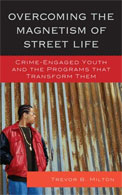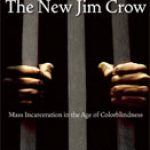Overcoming the Magnetism of Street Life:
Crime-Engaged Youth and the Programs that Transform Them

Author: Trevor Milton
Publisher: Lanham, MD: Lexington Books, 2011. 162p.
Reviewer: Victoria A. Sytsma | March 2012
Sociologists, and later criminologists, have long-since speculated upon the causes of criminality. Where the literature is lacking however is in the area of criminological intervention. Milton’s Overcoming the Magnetism of Street Life attempts to fill this void. The book presents case studies of several New York-based youth diversion programs to illustrate both his concept of “Survival Kit Theory”, and to argue for the increased use of community corrections programs. Contrary to what one might expect, this book is not a significant contribution to the program evaluation literature, but rather depicts the role of diversion programs within an urban landscape.
Prior to presenting his diversion program case studies, Milton provides readers with a crash course in contemporary American criminology. This includes a discussion of some of the problems associated with criminalizing juvenile delinquency, and a description of the dangers of prison socialization for young people. Additionally, he draws substantially from cultural criminology in his discussion of urban culture and black youth finding an identity in contemporary society. He also presents ideas around social capital, collective efficacy, and community justice through the examples of BronxConnect and the Andrew Glover Youth Program. It is this bit of background into commonly discussed criminological notions that makes Milton’s book quite accessible to the layperson.
Milton summarizes the program logic behind New York City alternative to incarceration programs: BronxConnect, the Andrew Glover Youth Program, Each One Teach Once, and the Brooklyn Adolescent Link. Amid descriptions of diversion program mandates, activities, and in some cases evaluation results -with particular focus on interview data- Milton also presents the main contribution of his text to the field of criminology, his Survival Kit Theory. Milton operationalizes Survival Kit Theory as the availability of, and the amassing of the “social tools” required to endure in a given social structure. He argues that inner-city youth can build their survival kit vis-à-vis diversion programming which provides a means for convicted youth to avoid incarceration. The case studies presented in the book serve as examples of ways in which survival kits can be built, and incarceration avoided.
In addition to describing the activities of four youth diversion programs in New York City, Milton presents case studies of diversion program success stories. Of note is the discussion of ‘Antonio’ who faced challenges with gang involvement, societal expectations of failure, and regular police interaction. These case studies succeed in humanizing diversion programs and one cannot help but celebrate the successes of each youth discussed.
While remaining very accessible to those outside the field of criminal law and criminal justice, Milton touches on a wide array of themes; these include class, community deprivation, black and Hispanic male gender roles, male/female gender differences, political hurdles, and the deconstruction of racial stereotypes. As mentioned, the author provides a detailed look at specific cases of subjects served by youth diversion programs, as well as case studies of the four programs themselves. One downfall of the case study approach however, is of course the issue of external validity. Due to the focus on nuanced, youth-targeted programs in a particularly unique city, Milton’s findings are not necessarily generalizable to other settings. That said, while there has been a great deal written on potential causes of youth crime in urban settings, Milton’s text provides a clear and succinct contribution in what is otherwise a paucity of literature on criminological interventions.
Victoria A. Systma is a Ph.D. Candidate at Rutgers University School of Criminal Justice.


